In this edition
From the Director of Early Learning
Dear Families

In the last edition of ELC News, we celebrated the creation of the ELC Community Garden over the July break. This, of course, was based on the plans created by the children over the past months, their deep thinking and knowledge about gardens, their purpose and produce.
As you would have noticed, we have not rushed into the planting phase, instead taking a much more considered approach to our intentions behind the ELC community Garden.
I invited you to reflect on your thoughts about a community garden and was so delighted to receive a few responses. Many thanks to those families who have begun their dialogue with us. It’s not too late to contribute – we welcome your input into the possibilities of our community garden.
- How can we involve the extended community in this project?
- What do you consider to be the key learning intentions of our community garden?
- How would you like to be involved?
We are looking forward to hearing the voices of our community. Please contribute via email to kmount@stpetersgirls.sa.edu.au or add your thinking to our sheet in the foyer.
Maximising Outdoor Learning Opportunities
Our ELC endeavours to provide children with a balanced day of indoor and outdoor learning experiences irrespective of the seasons. We promote the educational and wellbeing aspects of outdoor learning. We provide protection to children when outdoors by minimising risks. An example of this is the introduction of our new wet weather gear. This ensures when children are in the park or in our mud kitchen, they can wear this clothing. Our aim is to ensure inclusion of all children and to optimise learning throughout the year.
Upcoming Events
We look forward to our annual Fathers and Special Friends’ Breakfast in two weeks. We love these events where we can bring members of our community together. We will place a RSVP sheet in each room and we encourage you to add your names if attending as this will ensure we don’t run out of croissants! This invitation is also extended to Playgroup and our non-Wednesday members of the community.
Have a wonderful week.
Kate Mount
Director of Early Learning
Save the Date
Wednesday 28 August: Fathers and Special Friends’ Breakfast, 7.45am
Monday 2 September: Reception Twilight Tour of Junior School, 5pm
Wednesday 11 September: Grandparents and Special Friends’ Afternoon Tea, 2pm
Friday 27 September: Term 3 ends
Fathers and Special Friends’ Breakfast
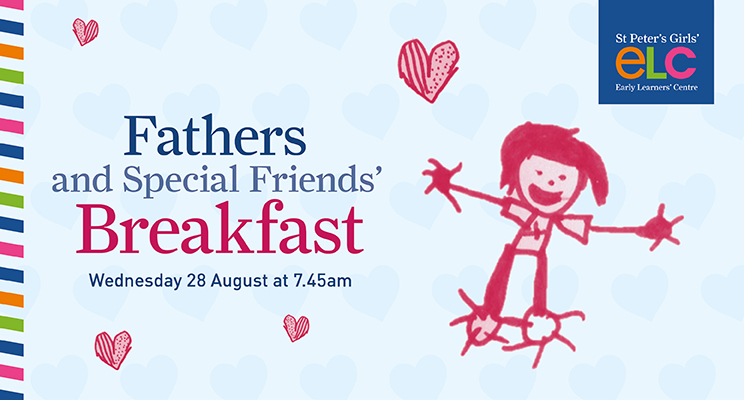
Please join us on Wednesday 28 August at 7.45am for a special celebratory breakfast.
A light breakfast will be served. We look forward to seeing you there.
ELC Enrolments for 2020
Our ELC Enrolments and Finance Officer, Sarah Elliott, has now sent out enrolment offers for ELC in 2020. We have taken into account any requests for additional days next year, and would also like to remind families of the minimum three day requirement once your child turns four years old.
We would also like to remind families that, if you do not wish to continue next year, one term’s notice is required. While we understand that circumstances change for families, we do appreciate the immediate communication with us when this has been the case. There is significant demand for places in 2020 and we have done our best to cater for all of our families. If you have any queries regarding ELC enrolments, please contact Sarah Elliott at your earliest convenience via selliott@stpetersgirls.sa.edu.au
Exploring the ELC Community Garden
Learning Community 2 has been spending time in the newly-created ELC Community Garden, taking their time to explore and understand the space at their own pace, and discovering new friends such as caterpillars and worms. Watch our video below to see more!
ELC Immunisation Policy
Under the Government’s No Jab No Pay policy, families must meet immunisation requirements to receive the Child Care Subsidy. Further information is available from the Department of Health by clicking here.
Children with high risk conditions, as well as children who are not immunised against them, may be excluded from the ELC in accordance with the ‘Staying Healthy: Preventing infectious diseases in early childhood education and care services’ guidelines. Please refer to our Exclusion Policy for further information.
Common illnesses requiring exclusion include:
Influenza
Chicken Pox
Conjunctivitis
Diarrhoea
Hand, Foot and Mouth Disease
High temperature
Infectious Hepatitis
Measles
Meningitis
Mumps
Rubella (German Measles)
Scabies
Scarlet Fever
School Sores (Impetigo)
Upper Respiratory Tract Infection
Vomiting
Whooping Cough
Reception Twilight Tour
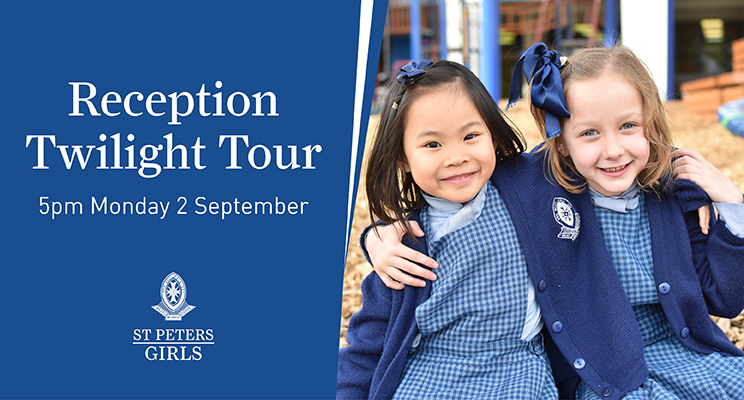
The Director of Early Learning, Kate Mount, and the Head of Junior School, Suzanne Haddy, warmly invite you to attend a Twilight Tour of the Reception classrooms.
Monday 2 September at 5pm
Meet in the Arts Centre foyer for refreshments
This is a perfect opportunity to meet Ms Haddy as well as our Reception teachers
and hear all about how your daughter can become a Saints School Girl.
RSVP to Enrolments Director Jess Geraghty via jgeraghty@stpetersgirls.sa.edu.au
Working with Children Check for our Valued Volunteers
We value family participation in the ELC and love seeing the connections that strengthen from parents and family members volunteering.
All people working with children now require a Working With Children Check (WWCC) which is valid for five years and is portable across organisations and roles so it can be used elsewhere.
This includes people who:
- are in paid or volunteering roles where it is reasonably foreseeable that they will work with children
- run or manage a business where the employees or volunteers work with children
- are employed to provide pre-school, primary or secondary education to a child
A WWCC assesses whether a potential employee or volunteer could pose a risk to the safety of children, based on criminal history and child protection information.
If you are considering volunteering for the ELC/School and you have a valid DCSI, this will continue to be valid until its expiry date which is three years from when it was issued. If you have not already given the School a copy of your DCSI, please send it through to Sue Dickinson with a note explaining which class or year group you will be volunteering for and the name of your child/grandchild. When your DCSI is due to expire or if you do not currently possess a DCSI, we will require your details as per below in order to commence the WWCC on your behalf.
- Full legal name
- Date of birth
- Preferred email address
- Purpose of application, e.g. parent volunteer
Please email these details to Sue Dickinson, EA to the Principal, who will commence the application on your behalf, via sdickinson@stpetersgirls.sa.edu.au
Kate Mount
Director of Early Learning
Absences in the ELC
Student Absences
Please notify the School via one of the following methods for late arrivals/early departures and absences, ensuring a reason for the absence is included.
Text: 0428 601 957 (save to phone contacts as SPGS)
Email: attendance@stpetersgirls.sa.edu.au
Phone: 8334 2200 or phone the relevant room as per the contact list
Feel free to also include the relevant room teacher when sending via email.
ELC Room Contacts:
Bell Yett – 8155 5777
Ferguson – 8155 5776
Hallett – 8155 5775
Stonyfell – 8155 5778
Kate Mount
Director of Early Learning
Accessing your Child’s Learning Community Home Page
Your child’s Learning Community Home Page is a dynamic online sharing space that invites you to participate in your child’s learning as it happens. It provides a window into your child’s life at the ELC as educators share intentional teaching, specialist lessons and spontaneous moments.
We can share videos and images directly with parents that capture the rich learning experiences in which your child is engaged throughout their time at the ELC. The Learning Community Home Page also enables us to share more of the process of learning, rather than just the end product.
Your child’s Learning Community Home Page is accessed through the myLink Parent Portal. If you have not accessed myLink or your child’s Learning Community Home Page before, please follow these instructions:
Accessing myLink for the first time:
- Visit https://mylink.stpetersgirls.sa.edu.au
- To set your first password, click the link below the sign in section
- Enter your username, click ‘Next’
- On the next screen, enter the security code emailed to you
- Enter the password you would like to use and press submit
- Return to the login screen at https://mylink.stpetersgirls.sa.edu.au to access myLink
- Several instructional videos are available via the Welcome page if you click on the ‘HELP’ menu tab.
Accessing the Learning Community Home Page through the myLink Parent Portal:
- Access myLink as per above instructions
- Click on the ‘MYLINK HOME’ tab
- Click on your child’s name tab
- Under ‘Class Contacts’ click on the ELC room name (you may need to enter your parent username and password again)
If you have any problems accessing or navigating myLink, please contact the IT Helpdesk via 8334 2227 or helpdesk@stpetersgirls.sa.edu.au.
Photo Etiquette:
Please note that your child’s Learning Community Home Page and Portfolio will contain some images and video of other children. We therefore ask that you do not copy or share images or videos, especially on social media, if they contain other children.
来自黄老师的信息
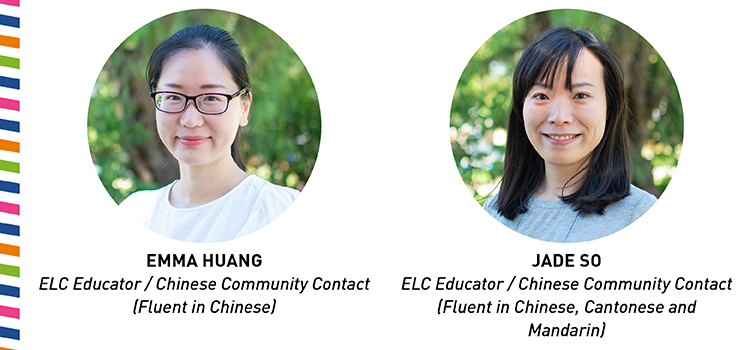
亲爱的家长朋友们:
在过去的几个月里,我们ELC小朋友在日常思考学习过程中,产生了打造我们自己的社区花园的想法。也如您所见,在假期里,我们的社区花园已经慢慢建立起来。我们希望通过构建ELC的社区花园,小朋友能从中探索和学习到更多的东西。在这里十分感谢为我们提出宝贵建议的家长们,我们也期待更多家长朋友们参与到我们的队伍中来。我们如何让大社区更好地融入花园建设中来?你认为社区花园对小朋友最为重要的学习要点是?你希望如何参与社区花园中来?
如果你有任何想法可以在Hallet路入口的社区花园册上留下你的建议或者给我们的园长发邮件: kmount@stpetersgirls.sa.edu.au
小朋友们积极参与到户外活动
在各个季节中,我们ELC会尽可能给小朋友提供各种室内和室外活动。我们也希望小朋友通过参与到户外活动中,增强他们的身体素质。最近,我们添置了新的户外活动的防水衣物,以便孩子们日常参与Ferguson Park或者“泥巴厨房”活动。我们的目标是让小朋友积极地参与到户外活动中去。
2020 ELC 招生
我们的招生部已经开始着手2020年的招生工作。我们会把尽力安排希望添加额外天数的家庭。在这里提醒家长们,一旦你们的小朋友四岁以后,在我们ELC每周就读天数是至少三天。如果你有任何假期或者出行安排,请提前一个学期告知我们。如果任何紧急情况的发生,也请第一时间让我们知道。最快的方式是发邮件给Sarah Elliott, 她的邮箱是:selliott@stpetersgirls.sa.edu.au
ELC父亲节早餐活动:
8月28日早上7点45分是我们的父情节早餐活动。我们很高兴家长朋友们能参加,也能和其他家长互相交流。如果您来参加,请尽让我们所在班级的老师知晓,这样确保我们为家长们提供足够的可颂面包。欢迎我们所有家庭的参与,包括我们的Playgroup成员。
Emma works in Learning Community 2 on Mondays, Thursdays and Fridays from 9am – 5pm, and Jade works 11am – 6pm every day in Learning Community 1.
Learning Community 1
News from the Stonyfell Room
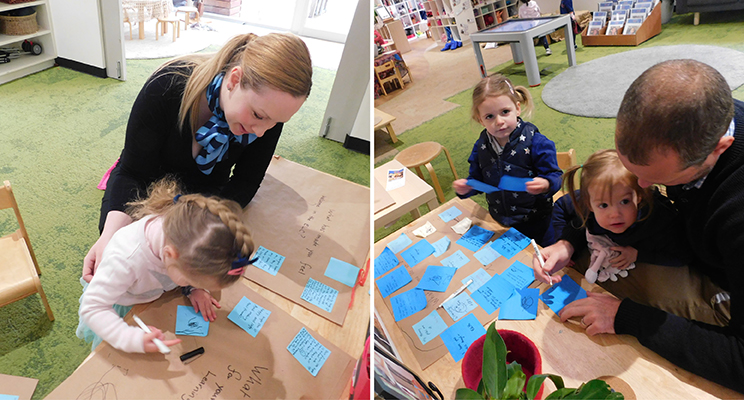
This term, we have welcomed six new families into the Stonyfell Room. What does it mean to be welcomed into a community? And how is that feeling of being welcomed sustained? Welcome is a value that must be expressed with every encounter in order to support the wellbeing of all of us – children and adults, families and educators – each and every day that we live together at ELC.
In our recent Information Evening for new families, several of the parents shared with us that this is the first time and the first place they have ever left their child with others. This is indeed an extraordinary privilege that we feel in our hearts and minds. Our role as educators is to both teach and to care, and to work in a relationship with the family as well as the child.
Loris Malaguzzi, the founder of the Infant-toddler Centres and Preschools in Reggio Emilia, said that our goal as educators is to create an “amiable school, hard-working, inventive…a place of investigation, learning, recognition and reflection, where children, teachers, families are happy”.
Our young friends who have just joined us are demonstrating remarkable resilience, yet it is not just the new friends but all of the children who make this transition between home and school each day. How much do we admire their courage as, at only two or three years of age, they find the resources to manage the day without their parents? How much do we marvel at their ability to make connections with new people, big and small? Credit must also go to the parents as you leave your child behind with us to do what you need to in the outside world. We are all participants in this act of welcome: as we welcome you into our learning community, you welcome us into your lives, trusting us with knowing your child. In this way, to welcome is an act of reciprocity that occurs throughout each day, through multiple encounters. This is what you are telling us about how you feel welcomed:
“Everyone always makes the effort to say hello. Everyone knows my name.”
“Our family feel the level of care across the ELC across all of the teachers. We love that we feel like family, and love seeing that everyone loves what they do every day.”
“The smiling faces that greet us every day. The thoughtful and supportive educators”
“We like the morning welcome from all of the teachers, giving our child comfort and leaving us parents confident in their care for the day. We also like the summary at the end of the day, of what moods and experiences the children have had”.
Mel Angel
News from the Bell Yett Room
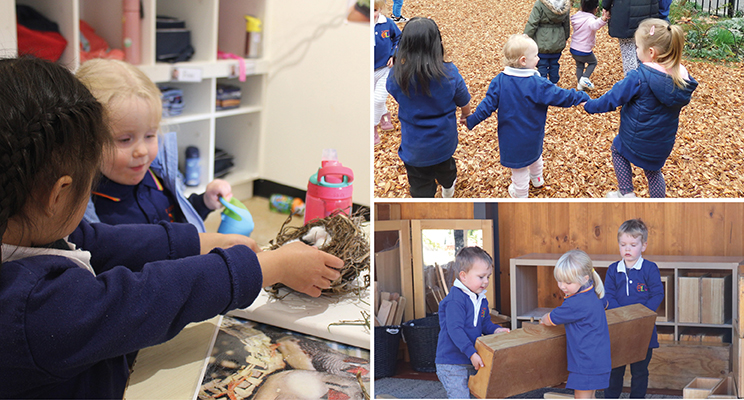
At the beginning of 2019, our ELC experienced a significant shift as we embarked on our journey of embedding a Learning Community approach. In Term 3, we have welcomed 17 new children and families into Learning Community 1 to join our learners aged 2 – 3.5 years.
As educators, we endeavoured to be brave, open-minded and to trust our hypothesis: a Learning Community approach with fewer transitions throughout the ELC journey would enable opportunities for deeper connections with peers, educators, families and the environment. The scope of age in each Learning Community would create opportunities for differentiated learning and possibilities to learn from and alongside one another. Being in one community for 18 months would give us time, something that is precious and moves quickly at this age.
As we have entered Term 3, we are witnessing a consistent theme of invitation and welcome amongst our new and existing children. Invitation into our already established rituals, welcome in our treasured spaces and friendship circles, communication beyond the verbal. We are seeing flexibility, acceptance and close observation. Our older children naturally falling into a leadership role and our younger children observing the skills of the older children and extending themselves to have a go. Of most significance to us is how we’ve observed our existing children so happily and naturally welcome new friends into our community. They are curious about each other and quick to recognise common interests. Together, we have laid the foundations for a smooth transition into ELC life.
Our new children are looking to their peers as much as their educators. Our older children are identifying when to help a younger friend, and our younger children are recognising when they can approach an older peer for help. This is special for us as educators as we consider ourselves to be learning alongside our children and consider the value of care for one another to underpin all of our actions.
Annabelle Redmond
Learning Community 2
News from the Ferguson Room
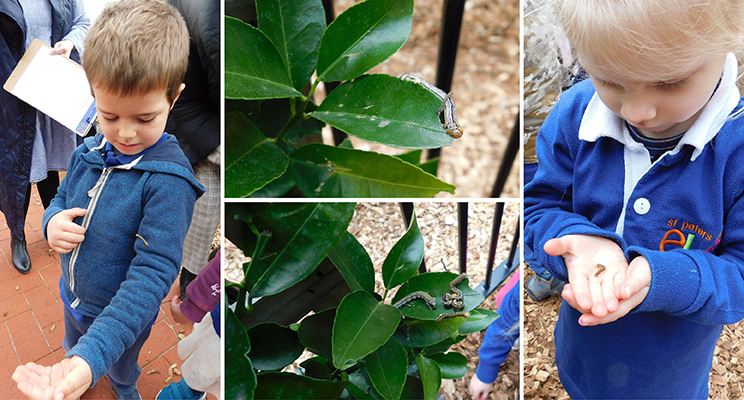
“Practicing sustainability empowers children to construct knowledge, explore values and develop an appreciation of the environment and its relationship to their worlds.
This lays the foundations for an environmentally responsible adulthood.” – Rhonda Livingstone
Over the past few weeks, the children have been connecting to and exploring the developing ELC Community Garden. Through spending extending periods of time in this space, the children have discovered it has become home to a large amount of caterpillars. The children have been excited by them and we have spent some time observing and discussing our observations. We have been videoing the caterpillars and, through the language of dance, mimicking their movements to develop a caterpillar dance. The children have now formed a friendship with the caterpillars. Angus had one crawling on him and he announced to the group, “I think this caterpillar is my best friend!”
Audrey was overcome with excitement and said, “There are so many caterpillars I can hardly breathe!”
One child’s theory is that the caterpillars are a family, consisting of mums, dads and many babies!
We have now come to a problem. The children have been able to identify this problem themselves.
“The caterpillars are eating all the leaves and that means there will be no oranges.” – Thomas
“(Looking at a leaf eaten by a caterpillar) We need the leaves to grow into food, they can’t be eaten.” – Holly
On the other hand, the caterpillars have become our friends, we have looked out for them and ‘rescued’ them when they were on the ground.
We asked the children their thoughts and we even took a vote. The children could not decide on whether they should stay or not. The children are conflicted. We are at a crossroad. We know that they are not beneficial to the growing plants but the children have a developed a fondness for them.
Our intention for the Community Garden is to grow and eat our produce however the caterpillars go against this vision. We would like to invite you into this conversation. Do any of you have experience in ethically and naturally managing caterpillars in the garden? Do you have any advice you could lend us? Please come and chat to us or email as we would love to hear from you.
Laura Reiters
News from the Hallett Room
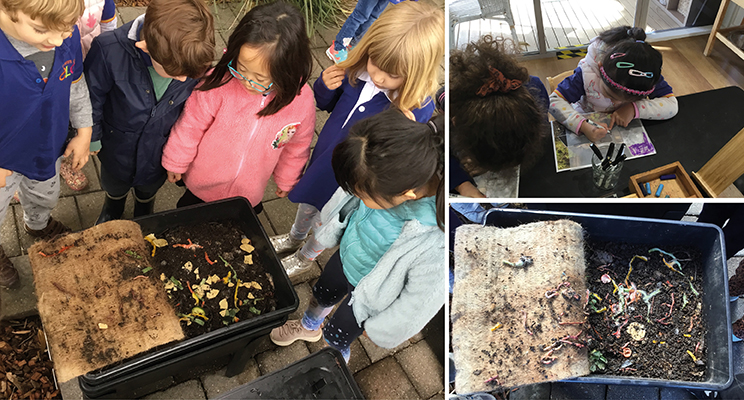
What sustainable practices do you engage in at home?
Learning about sustainability starts with everyday practice. Engaging the children in developing and maintaining our worm farms this week has enabled children to share their expertise and develop their skills as leaders within our community. Through dialogue in our small groups, children have been confidently ‘loaning their knowledge’ to others as we strive to develop sustainably conscious citizens.
“Worms like the dark.” – Crystal
“They eat food scraps.” – Eric
“They make compost to feed the garden.” – Olivia
“They do not eat oranges.” – Elijah
“Worms are not poisonous.” – Aubrey
“Worm farms have a tap, worm wee comes out.” – Emily
“They sleep and have a blanket.” – Grace G
As educators, we were thrilled with the prior knowledge that was shared. It is now our responsibility to action this and embed it into our everyday practice. We believe that as children become active participants and decision-makers, they will develop appreciation, knowledge, understanding, skills for and values about the environment. Giving children the ability to be responsible engages them in critical thinking, problem-solving and action.
So, where to next…research!
“What do worms eat?” –Harriet
“Where do we put the worm scraps?” – Hannah
“Why are the worm farms not in the Community Garden?” – Elijah
On Friday, a few friends went to the School Library to begin our research. We borrowed books on how to effectively keep a worm farm alive and watched a YouTube video by garden expert Costa Geordiadis. Costa explained that the worm farm is like a home, bathroom on the bottom floor, bedroom in the middle and kitchen and dining room at the top. We now have knowledge to share with the group about what worms do and do not eat and that they can only eat a lunch box of food per week.
The children have noticed that orange peel currently goes into our scrap bowls, Alessia suggested we “get a new scrap bin for the worms”. Moving forward, Crystal has suggested we have “nude lunch boxes” and “keep cracker boxes for making and playing”. If you have any food boxes that you would usually place in your recycling bin, we are collecting these for our making table. Please refrain from donating containers with products that included nuts, as well as egg cartoons and toilet rolls.
Please see the documentation outside the Hallett Room; we encourage you to add your comments and share your expertise with us.
Nell Tierney and Leanne Williams
